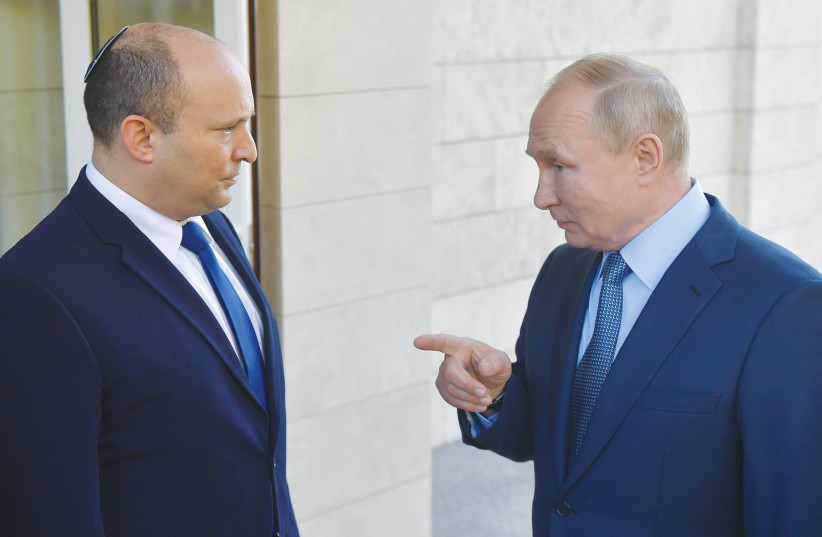Israel is considering its position as tensions rise on the Russia-Ukraine border, and the Foreign Ministry plans to deliberate the matter on Monday.
Jerusalem has generally maintained a position of neutrality between the countries since their 2014 war. Maintaining good relations with Moscow is a strategic interest for Israel in light of Russia’s significant military presence in Syria. Israel also has strong ties with Ukraine in a variety of areas, and Kyiv has the support of Israel’s most important ally, the US, in the current crisis.
Another major concern for Israel is how the Ukraine-Russia crisis will impact the Iran nuclear talks. The US and Russia sit around the same table, and their delegations met in Vienna over the weekend.
Mikhail Ulynanov, head of the Russian delegation to the Iran talks, on Saturday tweeted: “Russia-US relations are in extremely bad shape. However, on Iran we managed to work productively so far.”
In addition, both countries have large Jewish communities that could be impacted by conflict and are a consideration, a diplomatic source in Jerusalem said.

Other than Ukrainian President Volodymyr Zelensky asking Prime Minister Naftali Bennett and his predecessor, Benjamin Netanyahu, to try to mediate between him and Russian President Vladimir Putin last year – Putin wasn’t interested – there has been little international interest in Israel getting involved or taking a side.
Even when Russia-Ukraine tensions arose in a phone call between Putin and Bennett this month, and when US Secretary of State Antony Blinken brought the matter up in his call with Foreign Minister Yair Lapid, the Israelis mostly listened and did not view those conversations, nor the readouts mentioning Ukraine after the calls, as pressure.
According to Ksenia Svetlova, director of the program on Israel-Middle East relations at the Mitvim – The Israeli Institute for Regional Foreign Policies think tank, it remains unclear what direction the crisis will take. Anything from a Russian cyberattack to a limited military incursion to a full-scale invasion of Ukraine could happen, she said.
As long as the situation is unclear, the world will accept Israel’s neutrality, Svetlova said.
“The moment of truth is coming, and Israel has to think about what it’s doing,” she said.
Pressure on Israel to take a side would likely be both international and domestic, Svetlova said.
“If there is a war, with civilians killed, there will be pressure from the US and the very large Ukrainian community in Israel,” she said. “Many thousands of Israelis have family in Ukraine, and they are preparing to hold protests.”
Israel will have to maintain a very delicate balance if it chooses to make a public statement about the tensions, Svetlova said.
“We have almost total dependence on cooperation with the Russians on our northern border,” she said. “Israel may have to condemn [Russian actions against Ukraine], but in a delicate way that won’t reach the point of summoning ambassadors.”
That Germany and other European actors are not totally aligned with Washington against Moscow helps Israel maintain its ambiguity and allows it to take a softer line if it speaks out against Russia, Svetlova said.
Zelensky’s attempt to have Israel host a summit between him and Putin, or even mediate at a lower level, shows desperation, she said.
“Ukraine sees Israel as an extension of American policy, like everyone else does,” she added. “Israeli mediation was an attempt to bring their distress to the Americans’ attention. It never had a chance of working.”
If Russia invades Ukraine, thousands of Ukrainian Jews or descendants of Jews may choose to immigrate to Israel, Svetlova said, calling on the Aliyah and Integration Ministry to prepare for their arrival.
“It is important to emphasize that nothing is over yet... a decision hasn’t been made [by Putin] yet about how to act or what the final goal is,” she said.
In fact, Russia is gaining from the continuing uncertainty and tension, in which the US and Europe are paying attention to Moscow and listening to its demands, and may have more to lose from launching an actual war, Svetlova said.
Regarding the situation, the Aliyah and Integration Ministry said: “At this time, there is no increase in the number of immigrants from Ukraine compared to last year. If there will be, the ministry is prepared to handle it as it has in the past and is in contact with the relevant parties, including the Jewish Agency and Nativ.”
Aliyah and Integration Minister Pnina Tamano-Shata is following the situation and receiving constant updates, her representative said.
